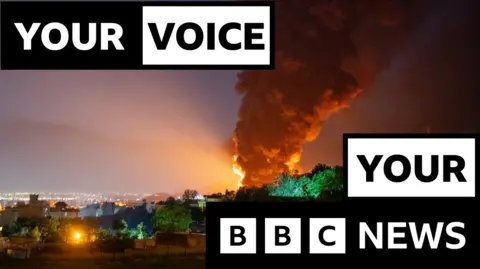 Getty
GettyIran and Israel continued to attack each other on Wednesday night, as US President Donald Trump said “I may do it, I may not do it” when asked whether the US would join the conflict.
BBC experts and correspondents answer your questions about what is happening – and what could happen if the conflict escalates.
Why is Israel bombing Iran now?
Israel’s position on this is that it has no choice, that it believes in the last few months Iran was accelerating towards building a nuclear weapon, and that talks aimed at curbing Iran’s nuclear programme were going nowhere, and that therefore this was the last resort.
They have said they see an existential threat from Iran, and have argued that if Iran acquired a nuclear weapon it would use it because it has previously vowed to destroy the state of Israel.
That Iran was close to building a nuclear weapon is not necessarily a view shared by the rest of the region, and it is not necessarily shared by the International Atomic Energy Agency, nor is it shared by the last open source report we have seen from US intelligence which did not say that Iran was about to produce a nuclear weapon.
– Frank Gardner, security correspondent
Where can civilians in Iran go?
The Israel Defense Forces has issued some evacuation notices for certain parts of the capital Tehran, but these areas are extremely dense and highly populated.
We’ve seen footage of huge traffic jams as enormous lines of cars try to escape Tehran towards the northern part of the country, which they consider safe.
But there have been strikes on those areas as well. Because the targets have been so widespread by Israel, no area can be considered safe.
In Tehran, the government announced they were opening the metro stations 24 hours a day so people can take shelter.
Tehran has 10 million people, so you can imagine evacuating that number of people is not really possible.
– Nafiseh Kohnavard, Middle East correspondent
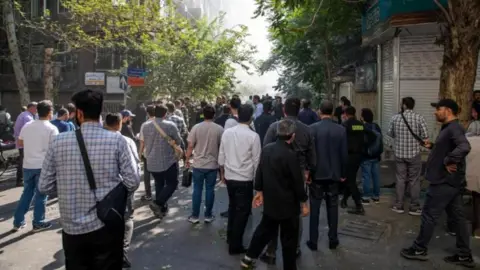 Reuters
ReutersIf US enters the conflict, would Iran strike US targets?
There is certainly risk, and the consequences for the US are fairly significant.
There are about 40,000 to 50,000 US troops at around 19 locations across the Middle East. There are US personnel based in Cyprus, and a US naval facility in Bahrain.
It will all depend on how the US decides to get involved, and to what extent.
– Mikey Kay, Security Brief host
Could Iran’s proxies support it in conflict with Israel?
I don’t think so – not any longer.
Since Hamas attacked Israel on 7 October, 2023, Israel has systematically taken down a lot of the first line of defence that Iran had.
They have depleted Hamas in Gaza, they have largely depleted Hezbollah’s arsenal in Lebanon, and Syria is no longer an ally of Iran because Bashar al-Assad has been deposed, albeit not by Israel.
The Houthis meanwhile are relatively constrained in Yemen. So they are not very well coordinated.
– Frank Gardner, security correspondent
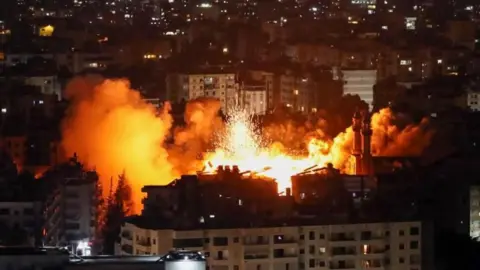 EPA
EPAWho is Iran’s leader and how much support does he have?
Iran’s supreme leader is Ali Khamenei. He is a religious figure, but he has much more power than Iran’s president.
He is the commander-in-chief of the armed forces and is a decision-maker for the country, including negotiations with the US.
But he does not command the support of all of Iran – his people are divided, and that division is deepening.
Iran witnessed huge protests against the regime only two years ago. Women participated in those protests, demanding their rights and freedoms.
But we cannot ignore that this regime still has its supporters – including in the armed forces which are connected to the regime.
– Nafiseh Kohnavard, Middle East correspondent
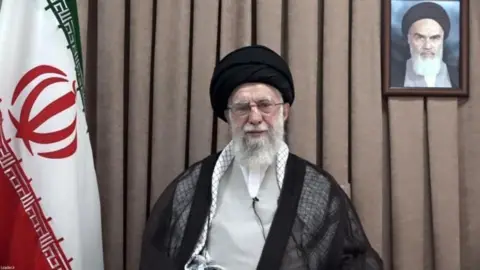 Reuters
ReutersWhat happens if the regime is overthrown in Iran?
There’s no clear answer.
We’ve seen over the last few years that there is no united opposition who could work together to replace the government.
Right now there are different options, including Reza Pahlavi, the exiled son of the former Shah of Iran, who is now living abroad.
He has supporters inside and outside Iran, but how many we can’t really say.
He has opponents as well, including reformists inside. They may not want to go back to Iran’s monarchy that was overthrown nearly 40 years ago.
So it’s not clear if there is one replacement.
– Nafiseh Kohnavard, Middle East correspondent
Where is Fordo and what is it?
Fordo is about 200km (124 miles) south of Tehran and is one of two critical enrichment facilities Iran has.
It has been built into a mountain for its protection. And it is basically one of the key enrichment facilities that Iran has been using to boost its enriched uranium stockpile.
Fordo has been struck by the Israel Defense Forces (IDF) already. However, it is believed the attacks were going after Iran’s surface-to-air missiles and air defence capabilities around it, in order to make it more vulnerable.
– Mikey Kay, Security Brief host
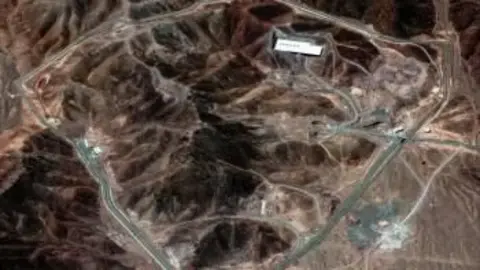 Maxar
MaxarHow close is Iran to getting a nuclear bomb?
The only people who know for certain whether or not Iran was working towards building a nuclear bomb are Iran’s most trusted nuclear scientists, the inner core of security officials and the supreme leader himself. The rest is conjecture.
But the alarm was raised earlier this month when the UN’s nuclear watchdog, the IAEA, found Iran to be in breach of its non-proliferation obligations, for the first time in nearly 20 years. Iran has amassed around 400kg of uranium enriched to 60%, well beyond the level needed for civil nuclear purposes.
The UN agency said Iran had failed to cooperate fully and that it was unable to verify there had been no diversion of nuclear material to nuclear weapons. That is not the same though, as stating Iran was racing towards building a bomb.
The Israeli military said last week that “over the past few months intelligence has shown that Iran is closer than ever to obtaining a nuclear weapon”.
But whose intelligence? Not apparently, its closest ally’s. In March, the US director of national intelligence, Tulsi Gabbard, told Congress that “while Iran had an unprecedented stockpile of weapons-grade uranium, it did not appear to be building a nuclear weapon”.
Iran, meanwhile, has always maintained that its nuclear programme is entirely peaceful.
– Frank Gardner, security correspondent
Does Israel have nuclear weapons?
There are estimates that it has about 90 nuclear warheads. But the real answer is we do not know.
It has neither confirmed nor denied a nuclear capability,
Israel is not part of the nuclear non-proliferation treaty, which was a global agreement to prevent more nations acquiring the bomb.
It takes three components to have a nuclear weapon: first, uranium enriched to 90%, second, the ability to build a warhead, and third, a way to deliver that warhead to a target.
As it stands, there is no overt declaration by Israel on any of the above.
– Mikey Kay, Security Brief host


